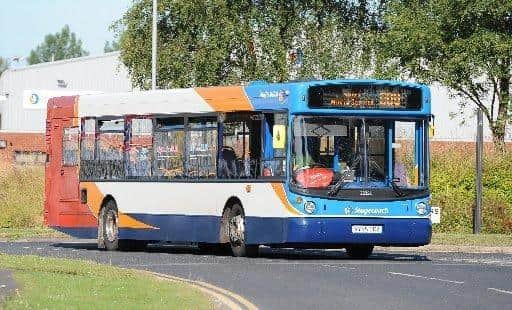Cleaner and quieter bus journeys could be on the cards as Lancaster poised to go electric
and live on Freeview channel 276
Lancashire County Council has made a pitch for £15.7m of government cash on behalf of two operators – Preston Bus and Stagecoach – to help bring electric buses to at least half a dozen services. A recent cabinet meeting of the authority heard that the vehicles can be up to 25 per cent more expensive than traditional diesel-driven versions.
A grant from the Zero Emission Bus Regional Areas (ZEBRA) Fund would cover three-quarters of that additional cost – and the same proportion of the bill for the new charging infrastructure that would also be required. The operators themselves would stump up the remainder, meaning that County Hall itself would not have to make any financial contribution to the scheme.
Advertisement
Hide AdAdvertisement
Hide AdIf the money is sent Lancashire’s way, electric buses would begin to take to the nine-mile route between Lancaster University and Heysham, via Lancaster city centre and Morecambe – as well as on some Preston routes – primarily on the number 19 service from the city centre to the Royal Preston Hospital and the 35 between the bus station and Tanterton.


Elsewhere, the Stagecoach services 1, 3 and 111 – between Preston and Longridge, Penwortham and Leyland respectively – would also go electric.
In what will be the second round of ZEBRA funding, the government has said that it will prioritise bids from rural transport authorities – and reserve between £25m and £50m from the total £129m pot for those council areas.
Although large parts of Lancashire are rural, the bus routes that have been included in the county council’s submission mean that the authority would not be eligible for that ringfenced share of the cash and will instead be considered in the second priority category, which covers those areas that did not receive any funding from the first round of ZEBRA allocations.
Advertisement
Hide AdAdvertisement
Hide AdBids will be accepted only for brand new buses, not the retrofitting of vehicles that are already on the road. Biogas and biofuel buses are also ineligible for funding as part of the initiative.
Hydrogen-powered buses could be supported by ZEBRA, but because they are at an early stage of development – and so would probably not meet the scheme’s minimum value-for-money criteria – they would have to prove “a genuine learning and innovation opportunity”, the Department for Transport says.
All vehicles funded by the ZEBRA scheme must meet what the government describes as “enhanced accessibility standards”. Those that carry 22 or more passengers have to provide an extra flexible space – in addition to the legally required wheelchair space – that can be used either by a second wheelchair or for at least two unfolded pushchairs or prams.
ZEBRA-backed buses for 17 or more passengers have to feature an induction loop to allow travellers using a hearing aid to communicate more easily with the driver, while vehicles of any size must carry a ramp or feature a lift to support disabled passengers getting on and off.